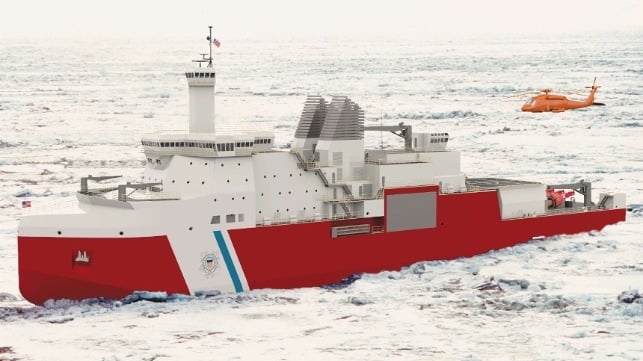Bollinger Cuts Steel on Prototype Modules for Delayed Icebreaker

Bollinger Shipyards inherited the U.S. Coast Guard's three-ship Polar Security Cutter (PSC) contract when it purchased VT Halter last year, and it is taking on a big lift. Bollinger has made a name for itself building the service's small but capable Fast Response Cutters (FRCs), and it delivers these vessels by the dozen - but a heavy icebreaker is a different kind of contract, and Bollinger is taking a different approach to production. It will start by building prototype sections, testing its methods and materials while training its workforce.
“We’re relearning how to build this type of ship,” explained Polar Security Cutter program manager Capt. Eric Drey. “It’s the first heavy icebreaker built by our nation in 50 years."
On Wednesday, the yard said that it has started cutting steel for the first of eight prototype modules for the PSC. The vessel's hull will have to be very thick to handle the stresses of breaking ice. In addition to the forces, the hull has to handle extreme temperature transitions, and cold water is only part of the problem. Between Arctic air temperatures of -50 degrees F and sub-freezing saltwater of +28 degrees F, the hull could have a temperature gradient of nearly 80 degrees F across the waterline. It will have be made out of a specialized steel to handle the impact and thermal stress.
With the prototype modules, Bollinger will test out systems, processes, tools and skills needed to work with this material. The lessons-learned, Bollinger said, will help inform the design and will improve quality of manufacturing. In addition, the modules will give Bollinger a head start on recruiting and training in advance of the formal start of construction, which is scheduled for 2024.

that matters most
Get the latest maritime news delivered to your inbox daily.
Bollinger's task may not be easy, and it inherited a program with heavy delays. The design phase is three years behind schedule, and the start of construction has been delayed accordingly. Last month, the Government Accountability Office completed a deep review of the PSC program and concluded that it "likely has unreliable schedule and cost estimates." During GAO's review period, design work was progressing slowly enough that the agency estimated that a mature design would take eight years to complete and approve. As of April 2023, program officials told the GAO that the speed is picking up, and the earliest they expect the design to be ready is March 2024.
In the meantime, the Coast Guard's sole heavy icebreaker Polar Star continues in service, and she is nearing her 50th anniversary. The venerable ship is undergoing a near-continuous refit to stay operational, including a replacement of her analog propulsion control system.
